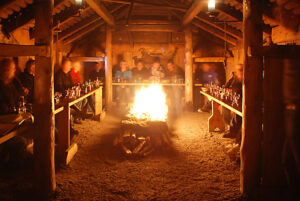
This post is part of Long and Short Reviews’ Winter Blogfest. Leave a comment for a chance to win an ebook copy of The Swan’s Road (book #1 in the Atheling Chronicles).
Christmas in the Eleventh Century by Garth Pettersen
 I have been wondering about Christmas in the early part of the 11th century when my characters in The Atheling Chronicles lived. I finally found some information. Here is a quick summary.
I have been wondering about Christmas in the early part of the 11th century when my characters in The Atheling Chronicles lived. I finally found some information. Here is a quick summary.
In the early 11th century, the good folk of Engla-lond were either Anglo-Saxons (Germanic) or Danes. Both groups had originally been pagan, believing in a whole pantheon of delightful gods and goddesses.
In 597 c.e. Pope Gregory the Great sent missionaries to Engla-lond with the PR strategy of continuity, i.e. keep as much the same as it was. Yule was a pagan festival (not connected with the Winter Solstice) with an association with fertility⸺it may have involved some ceremonial copulation.
The Church had decided (in the 4th century) that December 25 would be celebrated as the birth day of the Christ Child, so they turned the Yule fertility festival into a Christian feast day. In Anglo-Saxon the word was “Cristesmæsse.“ Easter was the more important festival for the Church, but around Christmas, the English would take part in fasts, vigils, prayers, and the giving of alms both to monasteries and to the common people, for the full twelve days before Christmas. The copulation part was dropped.
So there we have the beginning of celebrating the birth of Christ and the origin of gift-giving. The last tradition added during the Anglo-Saxon period was the holiday (holy-day) part. One of Alfred the Great’s laws (there were a lot of “Greats” in those days⸺we’ve forgotten all the “Not So Greats” such as Sven the Slackard) stated no one should work during the Twelve Days of Christmas.” This gave the hardworking folk of Engla-lond a much-needed rest and a reason to celebrate. So there you have it.
Gesælige Cristesmæsse!
In 1030 C.E., Cnute, king of England, Denmark, and Norway, sends Harald, his middle son, to the Kingdom of Dublin to meet with his Norse-Irish allies. Harald’s mission is to coordinate an invasion of the northern Welsh kingdom of Gwynedd, to replace King Rhydderch who is growing too powerful on England’s borders. Harald is reluctant to be involved in affairs of state, but agrees to go, even though his beloved wife, Selia, is unwell. Harald tells Selia he will not have to take part in the fighting.
Harald becomes involved in a conflict with Dublin’s neighbor, and to appease the king of Dublin, he commits to leading their combined forces in the attack on Wales. The plan is to replace King Rhydderch with Iago, the weaker King of Anglesey. The more Harald learns of these monarchs, the more his allegiance leans toward the man he has been sent to kill.
Will Harald unseat a strong and just ruler to carry out his father/king’s commands, or will he tread a more righteous road, which will destroy the life he and Selia have built in England?
Garth Pettersen is an award-winning Canadian writer living in the Fraser Valley near Vancouver, BC, where he and his wife board horses. Pettersen has a BA in History from the University of Victoria and is a retired teacher. His short stories have appeared in anthologies and in journals such as Blank Spaces, The Spadina Literary Review, and The Opening Line Literary ‘Zine. Garth Pettersen’s historical fiction series, The Atheling Chronicles, is published by Tirgearr Publishing and is available through most online outlets. The latest book in the series, The Sea’s Edge, received a first-place Incipere Award.
Facebook | Twitter | Goodreads
Buy the book at Tirgearr Publishing.












I can’t imagine celebrating Christmas for twelve days. It must have been fun!
I would love if the ban on working during the 12 days of Christmas was still in effect… lol. Thanks for the history lesson… most interesting!